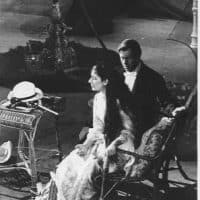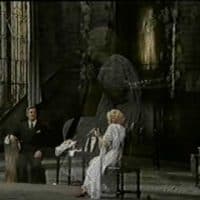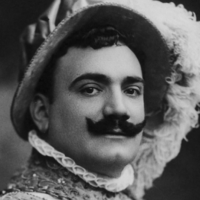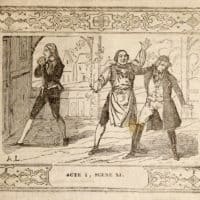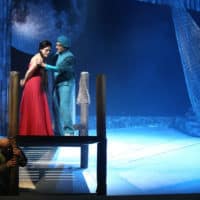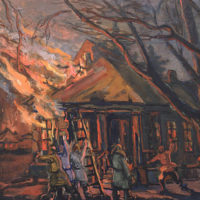 I visit the opera house to listen to the music and watch what happens onstage. But if you judged the opera house based on its role in literature, you’d think it was a hotbed of real-world excitement. Duels and trysts are arranged. Characters are shamed out of public life. Fights sometimes break out.
I visit the opera house to listen to the music and watch what happens onstage. But if you judged the opera house based on its role in literature, you’d think it was a hotbed of real-world excitement. Duels and trysts are arranged. Characters are shamed out of public life. Fights sometimes break out.
Some books take the opera house as their setting. Gatson Leroux’s The Phantom of the Opera (1909; famously adapted into a hit Andrew Lloyd Weber musical in 1986) tells of a disfigured man who inhabits and haunts the Paris Opera and his obsession with a budding young soprano. George Sand’s Consuelo (1842) is the story of an orphaned girl from Venice who studies music with Nicola Porpora. She becomes a sought-after soprano known as Porporina and manages to ward off aggressive suitors and conduct her bizarre love affair (involving hasty marriage, refused inheritance, death, resurrection, secret identities, imprisonment, a gothic castle, and a Freemasons-like cult) while singing on the finest stages of eighteenth-century Europe.
Opera can serve as the backdrop for novels’ key scenes. In Dumas fils’ The Lady of the Camellias (1848; the novel on which La traviata is based), Armand (the Alfredo character) first meets Marguerite (the Violetta character) at the opera.
A few days later there was a great performance at the Opera Comique. The first person I saw in one of the boxes was Marguerite Gautier.
The young man whom I was with recognised her immediately, for he said to me, mentioning her name: “Look at that pretty girl.”
At that moment Marguerite turned her opera-glass in our direction and, seeing my friend, smiled and beckoned to him to come to her.

“I will go and say ‘How do you do?’ to her,” he said, “and will be back in a moment.”
I could not help saying “Happy man!”
“Why?”
“To go and see that woman.”
“Are you in love with her?”
“No,” I said, flushing, for I really did not know what to say; “but I should very much like to know her.”
“Come with me. I will introduce you.”
“Ask her if you may.”
“Really, there is no need to be particular with her; come.”
What he said troubled me. I feared to discover that Marguerite was not worthy of the sentiment which I felt for her.
In the older Dumas’ oeuvre, The Count of Monte Cristo (1844) features an exciting challenge to a duel at the opera house. Viscount Albert de Morcerf seeks to avenge his father’s ruin (caused by the Count).
The door opened, and Monte Cristo, turning round, saw Albert, pale and trembling, followed by Beauchamp and Château-Renaud.
“Well,” cried he, with that benevolent politeness which distinguished his salutation from the common civilities of the world, “my cavalier has attained his object. Good-evening, M. de Morcerf.”
The countenance of this man, who possessed such extraordinary control over his feelings, expressed the most perfect cordiality. Morrel only then recollected the letter he had received from the viscount, in which, without assigning any reason, he begged him to go to the Opera, but he understood that something terrible was brooding.
“We are not come here, sir, to exchange hypocritical expressions of politeness, or false professions of friendship,” said Albert, “but to demand an explanation.”
The young man’s trembling voice was scarcely audible.
“An explanation at the Opera?” said the count, with that calm tone and penetrating eye which characterize the man who knows his cause is good. “Little acquainted as I am with the habits of Parisians, I should not have thought this the place for such a demand.”
“Still, if people will shut themselves up,” said Albert, “and cannot be seen because they are bathing, dining, or asleep, we must avail ourselves of the opportunity whenever they are to be seen.”
“I am not difficult of access, sir; for yesterday, if my memory does not deceive me, you were at my house.”
“Yesterday I was at your house, sir,” said the young man; “because then I knew not who you were.”
In pronouncing these words Albert had raised his voice so as to be heard by those in the adjoining boxes and in the lobby. Thus the attention of many was attracted by this altercation.
“Where are you come from, sir?“ said Monte Cristo “You do not appear to be in the possession of your senses.”
“Provided I understand your perfidy, sir, and succeed in making you understand that I will be revenged, I shall be reasonable enough,” said Albert furiously.
“I do not understand you, sir,” replied Monte Cristo; “and if I did, your tone is too high. I am at home here, and I alone have a right to raise my voice above another’s. Leave the box, sir!”
Monte Cristo pointed towards the door with the most commanding dignity.
“Ah, I shall know how to make you leave your home!” replied Albert, clasping in his convulsed grasp the glove, which Monte Cristo did not lose sight of.
“Well, well,” said Monte Cristo quietly, “I see you wish to quarrel with me; but I would give you one piece of advice, which you will do well to keep in mind. It is in poor taste to make a display of a challenge. Display is not becoming to everyone, M. de Morcerf.”
At this name a murmur of astonishment passed around the group of spectators of this scene. They had talked of no one but Morcerf the whole day. Albert understood the allusion in a moment, and was about to throw his glove at the count, when Morrel seized his hand, while Beauchamp and Château-Renaud, fearing the scene would surpass the limits of a challenge, held him back. But Monte Cristo, without rising, and leaning forward in his chair, merely stretched out his arm and, taking the damp, crushed glove from the clenched hand of the young man:
“Sir,” said he in a solemn tone, “I consider your glove thrown, and will return it to you wrapped around a bullet. Now leave me or I will summon my servants to throw you out at the door.”
In Pierre Ambroise Laclos’ novel Dangerous Liaisons (1782), the manipulative Marquise de Merteuil gets her comeuppance when she is shamed at the opera after her duplicity is revealed. She flees Paris for the countryside, where she contracts smallpox and becomes deformed. (There’s nothing like poetic justice!)
On her way back from the country last Thursday, Madame de Merteuil called in at the Comédie-Italienne where she has a box; she was sitting alone and not a single man visited her throughout the whole performance, something which she must have found extraordinary. After the performance, following her usual custom, she went into the little salon which was already full of people; immediately there was a great stir which she did not seem to connect with herself. Noticing a vacant space on one of the seats, she went over and sat down, whereupon all the women sitting on it stood up as if of one mind and left her completely isolated. This pointed indication of the general indignation was applauded by all the men and added even further to the buzz which people are saying even reached the point of hissing.
While novels these days are less likely to set their intrigues at the opera, it remains a popular venue for dramatic movie scenes. In The Fifth Element, a coloratura soprano alien morphs “Il dolce suono” into an impossible demonstration of operatic scatting. The performance is interrupted as a fight breaks out between our heroes and the Mangalores (who are working for the evil Zorg). Tragically, the diva (named, appropriately enough, Diva) is killed, and the opera house presumably sustains some serious damage. Also in the violent category is the chase scene and fight in Quantum of Solace, which takes place at a Bregenzer Festspiele production of Tosca.
Not every dramatic opera house scene involves a firefight. The sextet from Lucia di Lammermoor is watched uneventfully in The Departed. Love is sparked to the “Barcarolle” from The Tales of Hoffmann in Life is Beautiful, and “Donde lieta uscì” from La bohème marks the end of relationship in Moonstruck. And of course the only possible date night in Pretty Woman is a trip to see La traviata—the opera on which the film is based.
What are your favorite scenes in novels or films that take place in an opera house?
